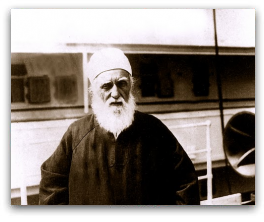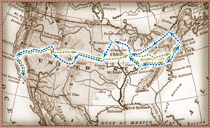With elections and transitions in numerous countries, the summer Olympics, the national cherry blossom centennial, a global climate change summit, a potential Mayan galactic alignment and much more on the horizon, 2012 promises to be a year to remember. In addition, for the Baha'i community, and particularly the North American Baha'is, 2012 will be a special year as they celebrate a unique centennial that is highly relevant for a time of change and transition.
For most of its formative decades, the central figures of the Baha'i community faced persistent imprisonment in Persia and the Ottoman Empire. There was, however, a brief period where Abdul Baha, the eldest son of Baha'u'llah and leader of the community from 1892 to 1921, was released from decades of imprisonment and circumstances allowed him to travel to Europe and North America. His journey through the United States and Canada from April to December 1912 will be celebrated next year by North American Baha'is with several national and numerous local events across the country. At these events, they will try to gain perspective on the world in 2012 by looking back at the dramatic changes over the past century, as well as examine issues like equality and social justice, war and peace, science and religion, which Abdul Baha discussed extensively in 1912 and which are as vital today.

(Image: Abdul Baha leaving the US, December 1912)
Nineteen-twelve, like 2012 promises to be, was a potent year that affected world history for many decades to come. In Europe, the major powers were heavily engaged in an arms buildup that exploded two years later. In the United States, there was a presidential election that was won by Woodrow Wilson, who was to lead the country to an unprecedented level of global engagement and which greatly influenced world affairs in the following century. Nineteen-twelve was also the year that the Titanic, initially seen as a symbol of the invincible power of progress, hit an iceberg and instead served as a reminder of human mortality.
The American Baha'is had provided money for Abdul Baha to sail on the Titanic. He asked instead that the funds be given to the poor and chose to travel on a more modest ship to New York in April 1912. From there he began an extensive speaking tour to discuss issues critical for the modern world that America and humanity were moving toward. On many occasions, he warned of an impending war in Europe and outlined mechanisms for global peace and disarmament. In synagogues, he warned of the possibility of a holocaust in Europe. In a highly segregated country decades before the civil rights movement, he spoke at the national meeting of the NAACP, Howard University and elsewhere about the critical importance of racial harmony to America. He spoke about economic issues that are topics of heated debate right now: the need for the elimination of the vast extremes of wealth and poverty, and the importance of just ways to harmonize labor and capital.

(Image: Map of the 1912 North American travels of Abdul Baha)
Baha'is will be particularly inspired in 2012 to look to the example of Abdul Baha's journey as they go about their daily lives. They may read and refresh their memories of his public talks. Where possible, they will try to visit the same sites he spoke at. Whatever happens during the year, they will be reminded of the unique lens that their faith provides of seeing, even in seeming chaos, a human race gradually moving towards a new stage of social evolution that is planetary in scope.
You don't have to be a Baha'i to join in celebrations of this centennial. After all, much of Abdul Baha's time in 1912 was spent with friends of the Baha'i community, including such well known Americans as Alexander Graham Bell, Teddy Roosevelt, Admiral Peary and others. Perhaps your grandparents or great grandparents might have been in the audience when Abdul Baha spoke, in which case the Baha'is would be delighted to learn of it. During a year of spectacular cherry blossoms, melting icebergs and much more, hopefully you may find some of the prescient insights from Abdul Baha's visit well worth your time to learn about. Ask Baha'is where you live what they are doing to celebrate this centennial and how you can find out more.
